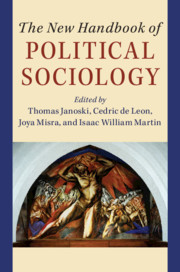Book contents
- The New Handbook of Political Sociology
- The New Handbook of Political Sociology
- Copyright page
- Dedication
- Contents
- Tables
- Figures
- Contributors
- Acknowledgments
- Introduction
- I Theories of Political Sociology
- II Media Explosion, Knowledge as Power, and Demographic Reversals
- III The State and Its Political Organizations
- IV Civil Society: The Roots and Processes of Political Action
- 22 The Challenges of Citizenship in Civil Society
- 23 Social Movements
- 24 Political Parties
- 25 Machine Politics and Clientelism
- 26 The Good, the Bland, and the Ugly
- 27 The Politics of Economic Crisis
- 28 The Influence of Public Opinion and Advocacy on Public Policy
- 29 Nationalism
- V Established and New State Policies and Innovations
- VI Globalization and New and Bigger Sources of Power and Resistance
- Index
- References
24 - Political Parties
From Reflection to Articulation and Beyond
from IV - Civil Society: The Roots and Processes of Political Action
Published online by Cambridge University Press: 22 February 2020
- The New Handbook of Political Sociology
- The New Handbook of Political Sociology
- Copyright page
- Dedication
- Contents
- Tables
- Figures
- Contributors
- Acknowledgments
- Introduction
- I Theories of Political Sociology
- II Media Explosion, Knowledge as Power, and Demographic Reversals
- III The State and Its Political Organizations
- IV Civil Society: The Roots and Processes of Political Action
- 22 The Challenges of Citizenship in Civil Society
- 23 Social Movements
- 24 Political Parties
- 25 Machine Politics and Clientelism
- 26 The Good, the Bland, and the Ugly
- 27 The Politics of Economic Crisis
- 28 The Influence of Public Opinion and Advocacy on Public Policy
- 29 Nationalism
- V Established and New State Policies and Innovations
- VI Globalization and New and Bigger Sources of Power and Resistance
- Index
- References
Summary
Political articulation is a new approach, albeit with classical roots, that seeks to bring the study of political parties back into sociology. It is a theory of how the components of the social are stitched together, centering on the role of political parties in the formation of social identities and interests. Though Max Weber, Robert Michels, Paul Lazarsfeld, and Seymour Martin Lipset produced the foundational texts in the field, sociologists from the late 1960s onward ceded party politics to political scientists. To the degree that sociologists studied institutional politics at all, they tended to follow the lead of Lazarsfeld and Lipset, who held that social “cleavages” – or divisions within the electorate such as class, race, and religion – determined the content of party politics (Lazarsfeld, Berelson, and Gaudet 1948 [1944]; Lipset 1960; Lipset and Rokkan 1967).
- Type
- Chapter
- Information
- The New Handbook of Political Sociology , pp. 646 - 665Publisher: Cambridge University PressPrint publication year: 2020
References
- 1
- Cited by

